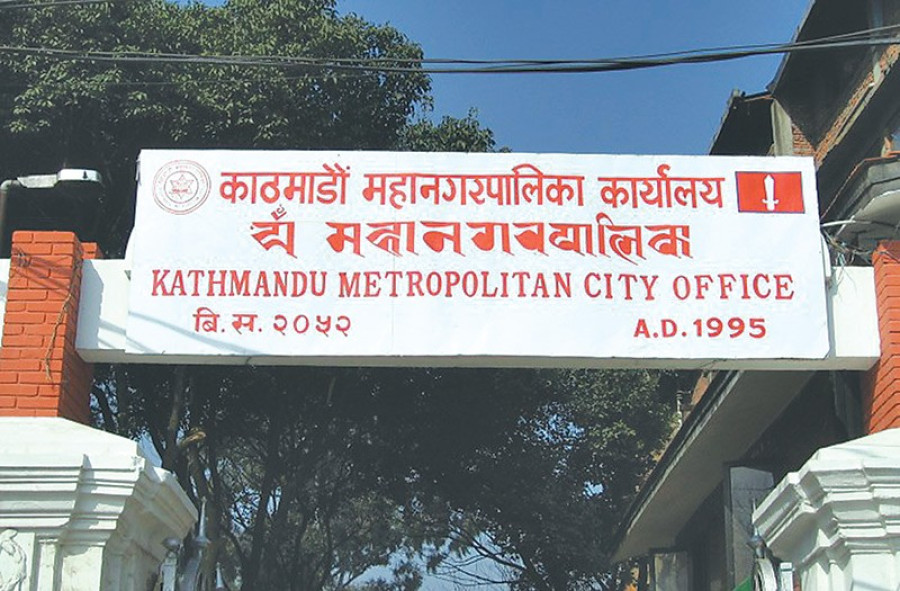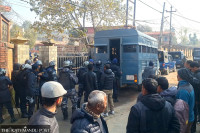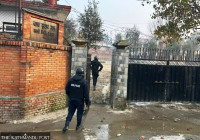Valley
KMC declares new far-fetched target
The Kathmandu Metropolitan City has come up with yet another ambitious plan to make Kathmandu a ‘smart city’: it now aims to construct ‘smart public toilets’ in the metropolis.
Anup Ojha
The Kathmandu Metropolitan City has come up with yet another ambitious plan to make Kathmandu a ‘smart city’: it now aims to construct ‘smart public toilets’ in the metropolis.
Following the announcement, town planners started criticising the decision by calling it just another ‘pretentious, hollow’ promise by the body to deceive the public. Critics of the move are sceptical whether the metropolis will be able to pull this move off, considering it has failed to deliver on all its promises till date and has been unsuccessful in managing existing public toilets that offer basic facilities.
“Smart public toilets are necessary, but their feasibility must be tested before they are rolled out. The metropolis has made a lot of ‘toilet talk’ over the years, but it has not been able to fix even existing toilets, many of which can be made usable,” said Kishor Thapa, an urban planner1 and former government secretary.
Of late, KMC’s Mayor Bidya Sundar Shakya has been receiving a lot of flak from his voters regarding his performance. Despite being in office for more than 20 months, Shakya has not met any of the 101 promises he had made when he won the election. This new move is being touted by critics as a new ‘gimmick’ to Shakya’s aim to make the city ‘smart’, and an attempt to show something for work. Under Shakya’s leadership, KMC has employed various ‘smart’ campaigns, such as ‘smart zebra crossing’, ‘smart dustbins,’ ‘smart parking’, ‘smart bus stand’, and ‘smart solar lamps’. The KMC’s ‘Smart Urban Technology Challenge-2018’ is also going on in full swing.
To implement the ‘smart toilet’ programme, the metropolis on Sunday formed a Higher Powered Smart Toilet Construction and Operation Committee under Deputy Mayor Hari Prabha Khadgi. But when the Post inquired as to what a ‘smart toilet’ will be like, KMC Spokesperson Ishor Man Dangol didn’t have a clear answer.
Smart public toilets use
sensors and radio-frequency identification tags, and host smart features such as heated seats, warm-flowing water, and air-drying facilities. These toilets are already in use in many developed nations, and although the implementation of such toilets would be a step forward in the city adopting various technological advancements, these toilets do not fit the need of the hour. Based on an earlier Post report, the metropolis only has 16 public toilets that are currently in operation. A number far too less for the capital’s population, which is estimated to be around 1.6 million. Town planners estimate there are 150,000 people roaming around the city every day. And, needless to say, they need public toilets. But the KMC does not even know how many public toilets are currently in working condition. “The committee will complete its research in two weeks, and then we will hold a press conference where we will give the public a briefing of the status of public toilets,” said Dangol, who is also the ward chairperson of Ward-15.
Due to the unavailability of public toilets, people have been using toilets in hospitals, shopping malls, banks and restaurants. Some make use of mobile toilets that charge Rs5 to Rs10 per use, and can be found in a dozen or so places around the city. These toilets however do not meet basic hygiene requirements and are not friendly for disabled people.
“It’s tough to find public toilets, and even the ones that are there are too dirty and unhygienic to use,” said Shruti Pandit, a student of Ratna Rajya Laxmi Campus. “Because of this lack of public toilets, it is quite tough for us, especially for girls,” said Pandit.
This lack of toilets is an inconvenience to the public, but it is a graver cause of concern for public-service givers, such as transport workers. Because of the foul smell and low hygiene in the public -and mobile-toilets Nepal Transport Workers Associations on mid-November demanded that toilets be constructed in public spaces, particularly in bus stops, around the Kathmandu Valley.
However, this is not the first time the metropolis has promised to construct public toilets. This is a promise the KMC has been making for the past two years.
Back in 2017, right after Shakya was elected as the first mayor, he had announced that one of his first plans of action was to construct modern toilets in 48 places to make Kathmandu a ‘clean and liveable city’. Twenty months later, the metropolis has not been able to build even one latrine for the public.
Last year, the metropolis had announced that it would find 41 locations to construct clean, managed toilets. It had stated that these toilets would be constructed at locations that were only 200-300 metres apart, under a public and private partnership, so as to make life a little easier for the public. The metropolis has failed to deliver as promised, like always.




 16.12°C Kathmandu
16.12°C Kathmandu.jpg)











